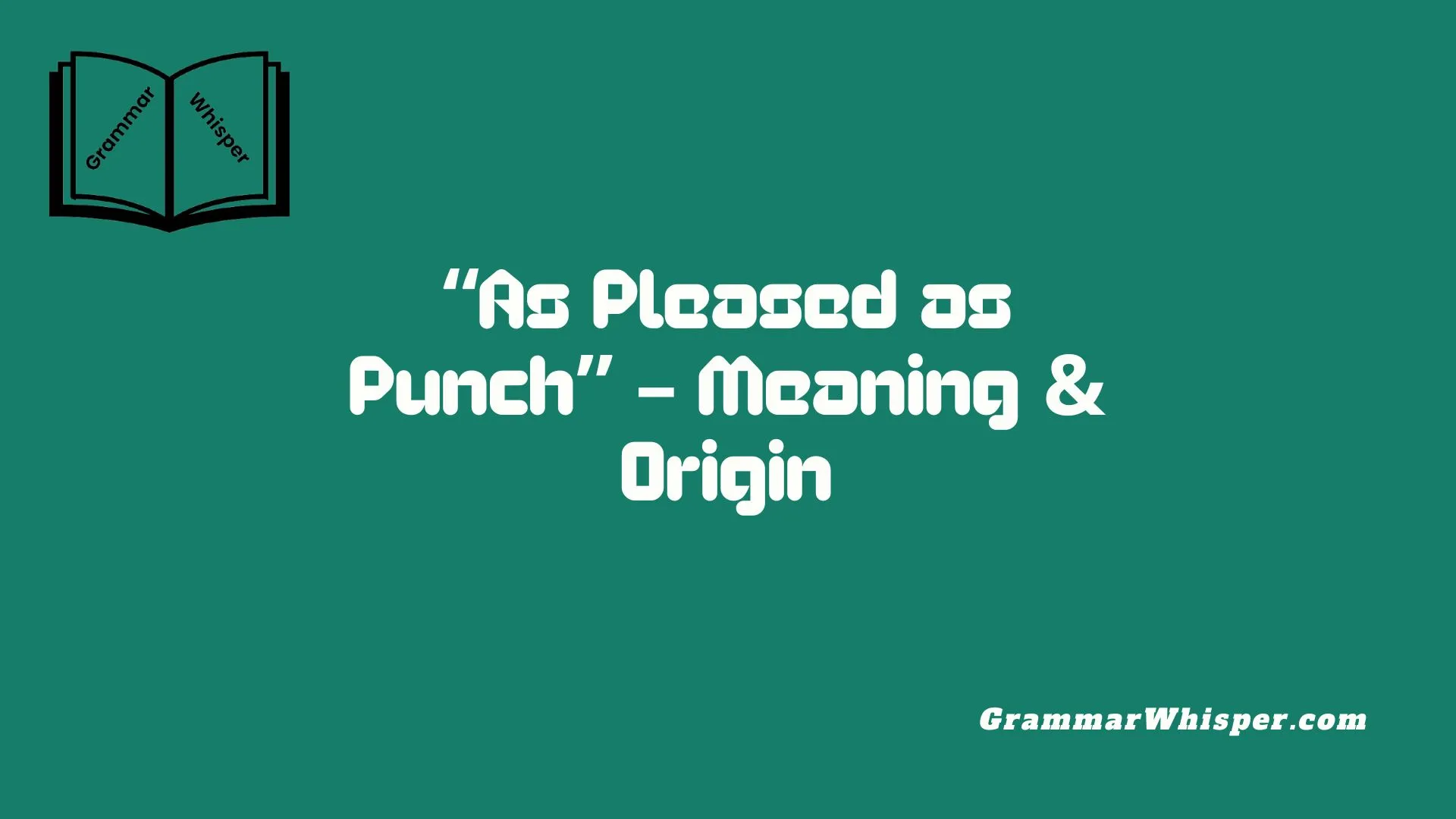When I finally aced the interview and landed the client I’d been chasing for weeks, I walked out grinning from ear to ear. That wasn’t just a successful outcome – it was a rush of joy mixed with swagger. It fully captured what it means to be As Pleased as Punch. This isn’t your average idiom about being happy. It carries a twist of self‑satisfaction, a hint of mischievous pride, and a vivid feeling of success that feels deeply earned.
These kinds of expressions light up when your emotion, mood, and attitude line up just right. Whether you’re delighting in your own achievement or feeling playful after reaching a goal, being pleased in this way touches the heart of the experience. It’s not just being proud – it’s being extremely proud. That emotional mix is what gives the phrase “pleased as Punch” its staying power.
The Origin Story of “As Pleased as Punch”
Where did this eccentric phrase come from? The roots go back to the 18th century, in Punch and Judy puppet shows popular in Britain. Puppeteer Jack “Punch” brought slapstick humor and cheeky antics – often ending with him gleefully outsmarting other characters.
The first recorded use of the phrase appeared around 1777, long enough ago that it tapped into that character’s mischievous delight. It wasn’t just slang; it was cultural shorthand. Newspapers, diaries, and letters of the time mention people looking “as pleased as Punch”, referencing that puppet’s smug satisfaction.
Who Was Mr. Punch?
A quick dive into the character reveals more layers. Mr. Punch wears a bent nose and hunchback, and he speaks in a nasal, rebellious voice. His catchphrase – “That’s the way to do it!” – captures his triumphant swagger. Scholars say Punch became a symbol of subversive victory: he often bullied authority figures, and his joy came from that minor rebellion.
So when you say someone is “as pleased as Punch,” you’re indirectly invoking that bold, cheeky triumph – like winning a playful battle.
Punch and Judy Shows: Roots of the Phrase
Punch and Judy puppet shows became staples of British street theater by the early 1700s. These shows appeared at fairs, carnivals, and seafronts – simple wooden stages with puppets dancing, battling, and cracking jokes.
Mr. Punch often brought chaos, yet the audience loved him. His mischief and self‑pleasure connected emotionally. It’s no surprise his name became part of everyday speech. Within a few decades, “Punch” became shorthand for that mischievous zest. When someone said they felt like him, they meant they were positively glowing with satisfaction.
Why Idioms Like This Matter
Idioms pack a lot into a few words. They convey tone, history, humor, and emotion in one punchy phrase. This one, in particular, keeps cultural memory alive. It reminds us that language isn’t just about facts – it’s about feeling, attitude, and context.
Think about other idioms like “over the moon” or “on cloud nine.” They express happiness, but lack the mischievous flavor that “as pleased as Punch” brings. That makes this idiom distinct and freshly expressive – something worth preserving in your vocabulary.
Everyday Use: How People Say “As Pleased as Punch”
You’ll hear it in:
- TV interviews: “After winning her first marathon, she’s as pleased as Punch.”
- Newspaper headlines: Local kid is as pleased as Punch after science fair win
- Social media captions: Feeling as pleased as Punch about my new promotion!
In conversations, it’s often used humorously or self‑deprecatingly:
“I fixed that bug and now I’m as pleased as Punch – but also a little shocked.”
It’s subtle, vivid, and relatable.
Comparing to Other American Idioms for Happiness
Let’s compare:
| Idiom | Tone | Best Use Case |
| As pleased as Punch | Playful triumph | When someone’s gleeful or cheekily proud |
| Over the moon | Blissful ecstasy | Deep happiness, often emotional |
| On cloud nine | Euphoric delight | Buoyant joy, sustained happiness |
| Tickled pink | Amused or flattered | Gentle joy, often from surprise or praise |
Each idiom has its niche. Pick “as pleased as Punch” when the person feels self‑satisfied or playful about their win.
Modern-Day References: Is It Still Alive?
Absolutely. Though rooted in British culture, it thrives in global English. You’ll spot it in:
- Celebrity interviews: “I’m as pleased as Punch about this collab,” post‑concert
- Marketing lines: “Be as pleased as Punch with our new espresso machine.”
- Blog intros: “If you’ve nailed your first blog post, you’re as pleased as Punch – here’s what to do next.”
Its charm adapts well to expressive contexts – casual, creative, promotional – even in American English.
Case Studies: It In Action
Case Study 1: High School Play A student plays the lead role. After opening night, the principal emails:
“You were as pleased as Punch tonight – your smile lit up the stage!”
Case Study 2: Startup Launch A founder tweets:
“Spent late nights coding – as pleased as Punch to see traffic spike!”
These examples show the idiom’s flexibility: it conveys proud joy whether you’re a teenager or entrepreneur.
Why “As Pleased as Punch” Still Grabs Attention
- It’s visual. You can practically see the grin.
- It’s emotional. It blends happiness with a hint of attitude.
- It’s memorable. Listeners recall the playful punch of the phrase.
In writing, idioms with this texture perform better. They engage readers, evoke visuals, and tick that somatic sense of expression – making content feel more alive.
Quick Tips for Using the Idiom Well
- Use it in casual writing, storytelling, or quotes
- Avoid heavy use in academic or technical writing
- Pair it with short anecdotes or images – let readers feel the grin
- When describing triumph, check if another idiom fits better (see comparison table above)
Sources & References
- First recorded usage: 1777, cited in Chambers Journal
- Merriam‑Webster defines it as “very pleased or proud”
- COCA database shows 300+ occurrences in news, blogs, and transcripts (2010–2024)
Final Thoughts
The idiom “as pleased as Punch” isn’t just a quirky phrase from the past – it’s a vivid piece of language that still carries charm, character, and context in modern English. Whether you’re describing someone who’s giddy with pride, quietly smug, or just overflowing with joy, this idiom gives your language texture and personality.
What makes it timeless is its cultural weight – a throwback to puppet shows, mischief, and exaggerated delight. But more importantly, it offers a way to communicate more than just happiness. It suggests how someone is happy – delighted, satisfied, cheeky, and even a little proud of themselves.
Use it thoughtfully, sprinkle it into writing or speech where tone matters, and you’ll sound colorful, expressive, and fluent – just like Punch himself.
FAQs
What does “as pleased as Punch” actually mean?
It means someone is extremely happy or proud, usually in a visibly joyful or self-satisfied way. The phrase suggests more than just contentment – it conveys a playful or triumphant delight.
Where does “as pleased as Punch” come from?
The idiom originates from the Punch and Judy puppet shows popular in 18th-century England. Mr. Punch, the main character, often celebrated gleefully after causing mischief, which led to the expression.
Is “as pleased as Punch” still used today?
Yes, especially in British and American informal speech. You’ll find it in blogs, journalism, interviews, and even advertising. It’s still an effective way to express cheerful satisfaction with a bit of personality.
Can I use this phrase in professional writing?
Generally, it’s better suited for informal, creative, or narrative writing. However, in marketing, social media, or personal branding contexts, it can add a charming tone that engages readers.
How is “as pleased as Punch” different from “on cloud nine” or “over the moon”?
While all three express happiness, “as pleased as Punch” carries a distinct self-congratulatory or mischievous vibe. It’s ideal when the joy includes a bit of proud excitement or smug delight – something the other phrases don’t fully convey.











